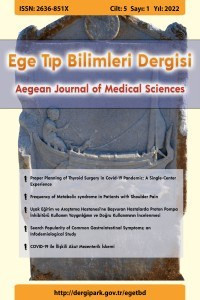COVİD-19 PANDEMİSİNDE TİROİD CERRAHİSİNİN DOĞRU PLANLAMASI: TEK MERKEZ DENEYİMİ
Amaç: SARS-CoV-2 virüsünün neden olduğu Covid-19 salgını tüm dünyayı etkiledi. Bu çalışma, Türkiye'de Covid-19 vakasının ilk görüldüğü 11 Mart tarihi itibariyle çeşitli tiroid hastalıkları nedeniyle ameliyat olan hastalarımızın verilerini sunmayı amaçlamaktadır.
Gereç ve Yöntem: 11.03.2020-31.12.2020 tarihleri arasında tiroid cerrahisi geçiren hastalar retrospektif olarak incelendi. Veriler, geçen yılın aynı döneminde (GYAD) tiroid cerrahisi geçiren hastaların verileriyle karşılaştırıldı.
Bulgular: Toplam 47 hasta dahil edildi. GYAD'de toplam 79 hasta ameliyat edilmişti ve %40.5'lik bir azalma mevcuttu. Hastaların 33'ü (%70.2) diferansiye tiroid kanseri nedeniyle ameliyat edildi. Geçen yıl bu oran %41,8 idi ve aralarındaki orantısal fark anlamlıdır (p=0,003). Covid-19 döneminde ameliyat edilen 47 hastanın sadece 1'inde (%2,1) Covid-19 pozitifliği gelişti.
Sonuç: Pandeminin başlangıcında yayınlanan kılavuzlar, geçici bir çözüm olarak acil durumlar dışındaki ameliyatların ertelenmesini önermektedir. Bu nedenle gelecekte pandemi ile mücadelede pandemi dışı hastaneler önceden belirlenmelidir.
Anahtar Kelimeler:
covid-19, tiroid kanseri, tiroid cerrahisi, endokrin cerrahisi, pandemi
PROPER PLANNING OF THYROID SURGERY IN COVID-19 PANDEMIC: A SINGLE CENTER EXPERIENCE
Objective: The Covid-19 outbreak caused by the SARS-CoV-2 virus affected the whole world. This study aims to present the data of our patients who were operated on for various thyroid diseases as of March 11, when the Covid-19 case was first seen in Turkey.
Material and Methods: Patients who undergoing thyroid surgery between 11.03.2020 and 31.12.2020 were analyzed retrospectively. The data were compared with those of patients who underwent thyroid surgery during the same period last year (DSPLY).
Results: A total of 47 patients were included. A total of 79 patients were operated on in DSPLY and there was a 40.5% reduction. Thirty-three (70.2%) of the patients were operated for differentiated thyroid cancer. Last year, this rate was 41.8%, and the proportional difference between them is significant (p = 0.003). Covid-19 positivity developed on in only 1 (2.1%) of 47 patients who were operated during the Covid-19 period.
Conclusions: Guidelines published at the beginning of the pandemic suggest postponing surgeries other than emergency conditions as a temporary solution. Therefore, in the fight against the pandemic in the future, non-pandemic hospitals should be predetermined.
Keywords:
covid 19, thyroid cancer, thyroid surgery, endocrine surgery, pandemic,
___
- 1. Smulever A, Abelleira E, Bueno F, Pitoia F. Thyroid cancer in the Era of COVID-19. Endocrine. 2020;70(1):1-5. doi:10.1007/s12020-020-02439-6.
- 2. Van Le Q, Ngo DQ, Tran TD, Ngo QX. The impact of COVID-19 pandemic on thyroid surgery in Vietnam. Eur J Surg Oncol. 2020;46(11):2164-2165. doi:10.1016/j.ejso.2020.07.022.
- 3. Updated Intercollegiate General Surgery Guidance on COVID-19. https://www.rcseng.ac.uk/coronavirus/joint-guidance-for-surgeons-v2/
- 4. COVID 19: Elective Case Triage Guidelines for Surgical Care Cancer Surgery. https://www.facs.org/covid-19/clinical-guidance/elective-case/cancer-surgery
- 5. Lombardi CP, D'Amore A, Grani G, et al. Endocrine surgery during COVID-19 pandemic: do we need an update of indications in Italy?. Endocrine. 2020;68(3):485-488. doi:10.1007/s12020-020-02357-7
- 6. Elanko Afsana, Khan Jim, Hamady Zaed ZR., Hassan Malik. Cancer surgery sustainability in the light of COVID-19 pandemic. Eur J Surg Oncol. 2020 Jun;46(6):1174–1175.
- 7. Zhang D, Fu Y, Zhou L, et al. Thyroid surgery during coronavirus-19 pandemic phases I, II and III: lessons learned in China, South Korea, Iran and Italy [published online ahead of print, 2020 Sep 2]. J Endocrinol Invest. 2020;1-9. doi:10.1007/s40618-020-01407-1
- 8. Bartalena L, Chiovato L, Marcocci C, Vitti P, Piantanida E, Tanda ML. Management of Graves' hyperthyroidism and orbitopathy in time of COVID-19 pandemic. J Endocrinol Invest. 2020;43(8):1149-1151. doi:10.1007/s40618-020-01293-7
- 9. COVIDSurg Collaborative. Elective surgery cancellations due to the COVID-19 pandemic: global predictive modelling to inform surgical recovery plans. Br J Surg. 2020;107(11):1440-1449. doi:10.1002/bjs.11746
- 10. Haugen BR, Alexander EK, Bible KC, et al. 2015 American Thyroid Association Management Guidelines for Adult Patients with Thyroid Nodules and Differentiated Thyroid Cancer: The American Thyroid Association Guidelines Task Force on Thyroid Nodules and Differentiated Thyroid Cancer. Thyroid. 2016;26(1):1-133. doi:10.1089/thy.2015.0020
- 11. Smulever A, Abelleira E, Bueno F, Pitoia F. Thyroid cancer in the Era of COVID-19. Endocrine. 2020;70(1):1-5. doi:10.1007/s12020-020-02439-6
- 12. Smith TJ, Hegedüs L. Graves' Disease. N Engl J Med. 2016 Oct 20;375(16):1552-1565. doi: 10.1056/NEJMra1510030. PMID: 27797318.
- 13. Shaha AR. Thyroid surgery during COVID-19 pandemic: Principles and philosophies. Head Neck. 2020;42(6):1322-1324. doi:10.1002/hed.26198
- 14. Puig-Domingo M, Marazuela M, Giustina A. COVID-19 and endocrine diseases. A statement from the European Society of Endocrinology. Endocrine. 2020;68(1):2-5. doi:10.1007/s12020-020-02294-5.
- 15. Li Q, Guan X, Wu P, et al. Early Transmission Dynamics in Wuhan, China, of Novel Coronavirus-Infected Pneumonia. N Engl J Med. 2020;382(13):1199-1207. doi:10.1056/NEJMoa2001316
- 16. Zhu N, Zhang D, Wang W, et al. A Novel Coronavirus from Patients with Pneumonia in China, 2019. N Engl J Med. 2020;382(8):727-733. doi:10.1056/NEJMoa2001017
- ISSN: 2636-851X
- Yayın Aralığı: Yılda 3 Sayı
- Başlangıç: 2018
- Yayıncı: Uşak Cerrahi Derneği
Sayıdaki Diğer Makaleler
COVID-19 ilişkili akut mezenterik iskemi: Derleme
Baran ÖZDEMİR, Karya Başak ÖN, Ezgi ALTINER
Yaygın Gastrointestinal Semptomların Aratılma Popülerliği; İnfodemiyolojik Çalışma
Barış SEVİNÇ, Nurullah DAMBURACI, Ersin TURAN
COVİD-19 PANDEMİSİNDE TİROİD CERRAHİSİNİN DOĞRU PLANLAMASI: TEK MERKEZ DENEYİMİ
Ayberk DURSUN, Korhan TUNCER, Semra DEMİRLİ ATICI, Göksever AKPINAR, Mehmet ÜSTÜN
Frequency of Metabolic syndrome in Patients with Shoulder Pain
